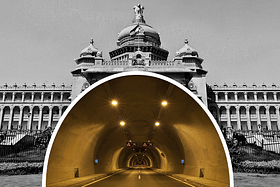Only two companies have shown interest in the ‘expression of interest’ floated by the Bruhat Bengaluru Mahanagara Palike (BBMP) for building the proposed tunnel roads in Bengaluru.
Announcing this on Monday (7 August), D K Shivakumar, Deputy Chief Minister of Karnataka and Bengaluru Development Minister added that to encourage more participation, the deadline would be extended.
On the same day, a private company made a presentation on the project to the Minister at an event that was not open to the media.
The tunnel road project, which involves converting the proposed 99-km-long elevated corridor network into tunnel roads, is one of the Congress government’s most controversial projects.
Estimated to cost nearly Rs 50,000 crore, the government plans to implement it through a public-private partnership mode.
Aecom, an international consultancy firm that has experience in tunnel road projects worldwide and had prepared the detailed project report for the elevated corridor network project in 2017, submitted a proposal for the tunnel network project.
The tunnel road was proposed for a length of 83 kilometre and included three corridors (North-South: Central Silk Board to Hebbal through the city (16 km); East-West: K R Puram to Gorguntepalaya and Jnana Bharathi to Varthur Kodi).
Additionally, three connecting corridors were proposed: Agara to Kalasipalya (9.2 km), Richmond Circle to Halasuru (2.3 km), and Kalyan Nagar to St John’s Church Road (7.5 km).
Initially proposed by K J George during his tenure as Bengaluru development minister in the previous Congress regime, the tunnel roads and elevated corridor network projects have faced opposition from civic activists and mobility experts.
Despite being included in the Congress manifesto for the 2023 Assembly polls and making progress towards implementation, the public is once again raising objections. Critics have labelled it as a narrow focus and a result of limited vision.
According to Sandeep Anirudhan, a citizen activist, the government’s estimated expenditure on the tunnel project could be better utilised in developing a comprehensive multi-modal infrastructure for Bengaluru, reports The Hindu.
This would involve investing in mass rapid transit, metros, suburban trains, increased bus services, improved first and last-mile connectivity, cycling lanes, pedestrian-friendly areas, and more.
By prioritising these initiatives, Bengaluru has the potential to become a truly international city.


